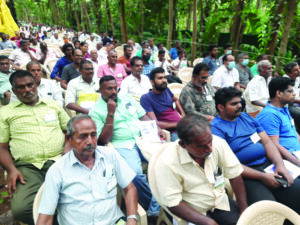CHENGALPATTU, JULY 24
A one-day workshop on tree-based agriculture was conducted by the Cauvery Calling team, on Sunday in Thirukazhukundram, Chengalpattu. The workshop, which attracted more than 1,000 farmers from all over Tamil Nadu, was held at Tamil Nilam,Tamil Pannai – a 15-acre farm owned by Deivasigamani, a prominent tree-based farmer of Chengalpattu.

The trainers for this workshop, onboarded by Cauvery Calling, included prominent scientists and experts. The hands-on training and experience sharing was conducted by seasoned farmers with significant experience in tree-based farming.
- Experts impart hands-on training on cutting-edge techniques in tree-based farming
- Sandalwood is the second highest valued wood and is required for various purposes such as making scents: Sundarrajan, Scientist, Institute of Wood Science and Technology, Bangalore
- Haridas, Retired Deputy Director of Agriculture from Panruti shares his pioneering experience of growing 100 varieties of jackfruit.
“Tamil Nadu has many farm lands that are arid and have less water,” said Ganesan, a prominent Red Sanders farmer from Hosur.
“By planting timber trees in these lands, the farmer can make profits and also increase the biodiversity in the land, ensuring both the environment and the farmer prosper. Red sanders, a high value timber tree, grows well in lands that have less water. After 30 years, one tree gives about 100 – 150 kgs of timber. Currently, the market price for 1 ton of red sander wood is 40 to 50 lakhs,” Ganesan added.
Ganesan further apprised the attendees that the current restrictions on felling and selling of Red Sanders will shortly be removed. “We are asking the government to take the necessary steps to make this happen and establish a timber board,” he added. “Most importantly, trees grown on farm lands must be removed from the forest produce list,” he explained.
“Sandalwood is the second highest valued wood and is required for various purposes such as making scents,” said. Sundarrajan, Scientist, Institute of Wood Science and Technology, Bangalore, during his session on Sandalwood farming. “Sandalwood oil is sold for lakhs. A 15-year old Sandalwood tree, free of any damage, gives approximately 12 kgs of timber. Currently one kilo is sold for Rs 12,500. Just one tree can fetch Rs 1.5 lakhs for the farmer,” the scientist said.
Sundarrajan went on to laud the practice of Soap companies under the Karnataka government, of purchase sandalwood directly from the farmers. “In Tamil Nadu, the laws allow farmers to sell sandalwood only through the forest department. These laws will definitely change in the next ten years. This will make it easier to sell timber,” he assured the Farmers’ Community attending the workshop, encouraging them to invest time and effort in Sandalwood Farming.
Fruitful effort
“I grow fruit trees such as Mango, Jackfruit, Banana, Amla, Guava and Sapota in my 15 acre farm, and along with these, I also grow timber trees.” said Deivasigamani – a pioneer in tree-based agriculture and also the owner of the farm where this Mega Workshop was held – elaborating on agroforestry techniques.
“I have made this farm into a food forest. Fruit trees give fruits for 15 to 25 years, after which they do not provide income. However, by planting timber trees along with fruit trees, one makes substantial profits after 20 – 25 years. It is very helpful to grow fruit trees for steady income and timber trees for a long term income, “ Deivasigamani concluded by urging farmers to make full use of the schemes under Cauvery Calling. “At Isha Nurseries the tree saplings are available for farmers at just Rs 3,” he said. “The same saplings cost much more at other nurseries. Therefore it is very beneficial for us.”
The farmers also gained from the insights of a number of experts, prominent being Haridas, Retired Deputy Director of Agriculture from Panruti who shared his pioneering experience of growing 100 varieties of Jackfruit.
Valluvan – a farmer from Pollachi – and Thirumalai – a farmer from Panruti – delved into the nitty-gritty of cultivating pepper in the plains.
The later half of the workshop was dedicated to hands-on training in the field, wherein the farmers were taken around the 15-acre ‘agroforestry’ farm, and all their queries were addressed.












